ATHLETICS
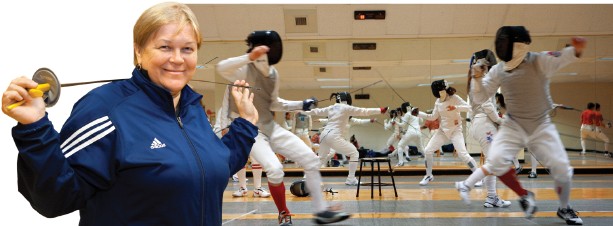
Left: Iryna Dolgikh, women's fencing coach. Above: A co-ed practice with members of both the womens varsity team and mens fencing club in Bartels Hall. See larger image
Fencing coach's determination carries her from Ukraine to Big Red
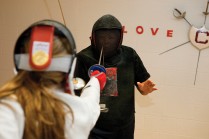
Dolgikh spars with a fencer. See larger image
When Iryna Dolgikh, Cornell's head women's fencing coach, was a 15-year-old in the Ukraine, a chance encounter with a crying woman in a hall of her high school changed her life.
The woman told Dolgikh that she had come to the school – the seventh she had visited – to recruit athletes for a fencing team, but not one student had registered.
Dolgikh signed up immediately and convinced 10 friends to join. From that fluke meeting developed a world champion who later became a well-respected international coach.
After just two years, she had won a national tournament and was invited by the Ukrainian national coach to attend the Olympic Reserve Training School, a school for members of the Ukraine's 30 different national sports teams. Dolgikh had been attending a school for gifted science students, ranking sixth in her class, but she chose to leave and begin training seriously as a fencer.
"My dad was supportive, but my mom was a little upset," Dolgikh laughs. "She thought I'd be a professor."
A stint with the USSR's Junior World team followed, and in 1976, just five years after first picking up a foil, a 20-year-old Dolgikh won the International Fencing Federation (FIE) World Championship.
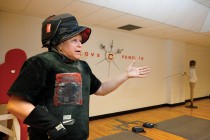
Dolgikh speaks to team members during practice. See larger image
The next stop should have been the Olympics, but instead of automatically qualifying as the reigning world champion, Dolgikh needed to earn her place on the USSR team via a two-day, 24-person tournament.
During a bout on the first day, her opponent's blade broke, and Dolgikh was impaled through the thigh. The on-site doctor advised that she go to the hospital, but Dolgikh was resolute in finishing.
"They stuffed the wound with cotton and covered it with tape," explains Dolgikh. "Not athletic tape. Just regular black tape."
Even with the serious wound, she finished the day in first place, before taking second overall at the tournament. However, she was denied her rightful spot on the team, a political decision that Dolgikh recalls as an injury worse than the one to her thigh.
Despite the disappointment, Dolgikh moved on, winning a gold medal at the 1977 World Cup, graduating in 1982 from the Kyiv Institute of Physical Education and marrying Oleksandr "Sasha" Gutor, a member of the Ukrainian national volleyball team.
The couple started a family – a daughter, Olena, and a son, Alex – while Dolgikh began coaching. But on April 26, 1986, their life in the Ukraine was irrevocably changed by the Chernobyl Nuclear Power Plant disaster.
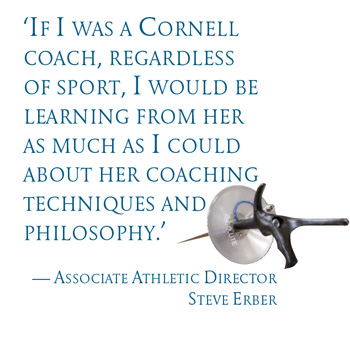
"One of our good friends was an army officer," she explains. "Nobody knew what happened that night, but the army was going there, and this friend said to Sasha: 'I will try to call you and if it's dangerous, I will tell you to get out.' So we were sitting all night with our bags packed, and once he called, we jumped into our car and left."
The couple drove 300 miles to Gutor's parents, staying for 10 days before he needed to return for his job as the Ukraine's junior national volleyball team coach. Fearing for the safety of their children, Dolgikh spent a year in Moscow with her parents.
"In the beginning, the government didn't tell the truth, but when we started to receive illegal information from other countries we began to understand what big trouble it was," she says. "So we started to look at going outside the country."
Luckily, Gutor was offered a job in Hungary, and later Dolgikh was hired by the Slovakian national fencing team. Over the next several years, many of Dolgikh's fencing contemporaries emigrated to the United States, and she began to wonder if she could do the same. In 2000, shortly after she posted her resume online, she received an offer by the Fencing Institute of Texas. Dolgikh accepted even though she barely spoke English and had to leave her family behind for a year.
Her stint in Texas brought great success, as well as an Extraordinary Ability Green Card, which led to a job as an assistant coach at Penn State. In three seasons, she helped the Nittany Lions to a pair of national runner-up finishes and saw her epee fencers sweep the top three spots at the 2003 NCAA championships.
When Cornell's coaching position became available in 2005, Associate Athletic Director Steve Erber turned to a former colleague, Paul Pesthy, one of the most accomplished epee fencers in U.S. history, for advice. It was Pesthy who informed Erber that an outstanding candidate was just a few hours away.
"We did not have a long list of candidates, but we had a number of very good candidates, of whom Iryna was and obviously remains the best choice," says Erber. "Iryna is an underrecognized asset to our coaching staff. If I was a Cornell coach, regardless of sport, I would be learning from her as much as I could about her coaching techniques and philosophy."
Since the day she was hired, Dolgikh has helped the Big Red to improve on the strip and has also been selected as a national coach for her adopted country, most recently serving as head coach of the U.S. Veteran fencing team for the past two years.
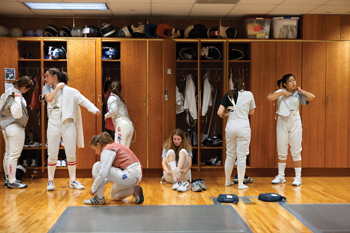
Members of the womens fencing team suit up before a practice. See larger image
"The World Championships was a fantastic opportunity for me to shine some light on our great athletic program, which improves the reputation of our growing fencing program," says Dolgikh.
With the same resolve of that young fencer who continued to battle despite being stabbed through the leg, Dolgikh now works tirelessly to bring in top fencers and provide them with the training they need.
"When I look at my career, I am very grateful to my country and everyone who allowed me to develop my talent," Dolgikh says. "I have many stories about travels and competitions that I have been a part of as a fencer, but the most important achievement for me so far has been rebuilding the Big Red program."